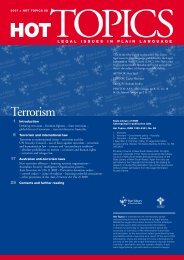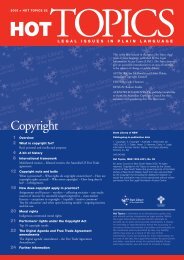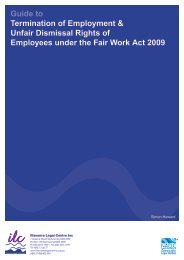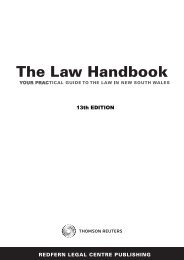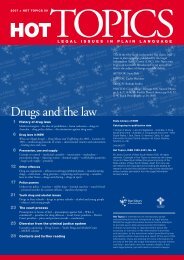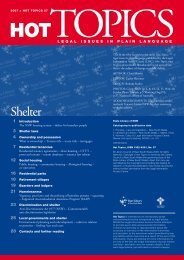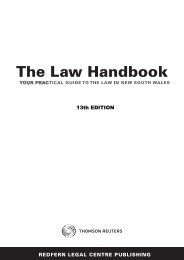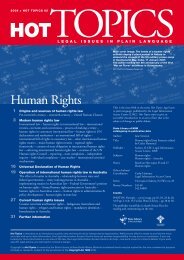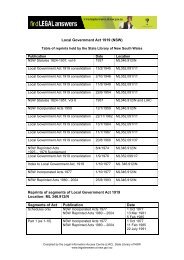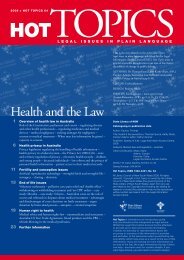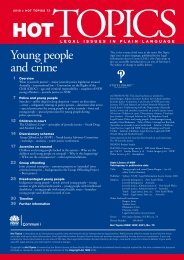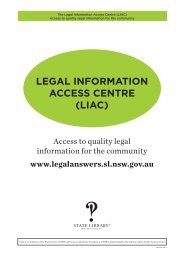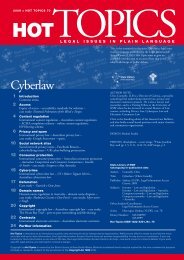Consumers | The law handbook - Legal Information Access Centre
Consumers | The law handbook - Legal Information Access Centre
Consumers | The law handbook - Legal Information Access Centre
- No tags were found...
Create successful ePaper yourself
Turn your PDF publications into a flip-book with our unique Google optimized e-Paper software.
11 <strong>Consumers</strong> 361to commence proceedings to obtain aremedy. <strong>The</strong> choice then is whether to takethose proceedings in the New South WalesCivil and Administrative Tribunal, or in oneof the traditional courts. <strong>The</strong> Tribunal’sgeneral upper limit on consumer claims(subject to what appears below) is $40,000.Where there is a claim for more than that,which will normally be the case for claimsfor personal injury, the proceedings must bein a traditional court.What advantages are there in proceedingbefore the Tribunal? <strong>The</strong> first is that the feeto file an application is much lower thanother courts. <strong>Legal</strong> representation is notnormally permitted, unless the Tribunalgrants it. <strong>The</strong>re has to be a special order ofthe Tribunal to permit legal representation,and before making an order, the Tribunalmust be satisfied that tests have beensatisfied. In the traditional courts, an unsuccessfulparty is normally ordered to pay thecosts of the opponent. Before the Tribunalmay make a costs order, it must be satisfiedthat special circumstances exist. This provisiongives some protection to a consumerwho has been unable to prove liability onthe part of the other party. On the otherhand, it may be necessary for a consumer toobtain some evidence to support the claim;even if the consumer is successful, theopponent cannot be ordered to pay thosecosts unless the Tribunal is satisfied thatspecial circumstances exist.Proceedings before the Tribunal are muchless formal than those in a traditional court.<strong>The</strong> Tribunal is required “to resolve the realissues in proceedings justly, quickly, cheaplyand with as little formality as possible” andthe Tribunal still requires evidence to supportthe claim and is required to follow therules of procedural fairness, but the Tribunalmay dispense with many formalities. Beforemaking an order, the Tribunal must use itsbest endeavours to bring the parties to theirown resolution of the dispute. At its Sydneyhearing rooms, and at rooms at some majorcentres, the Tribunal has specialist Membersand registry officers to help parties reachtheir own resolution of a dispute byconciliation. In some larger matters, a claimmay be listed for mediation, again before aspecialist Member. In addition to thesesteps, each Tribunal Member hearing a claimwill take individual steps to bring theparties to their own resolution.<strong>The</strong> Tribunal also has obligations to ensurethe:• parties understand the assertions each ismaking in the proceedings;• legal implications of those assertions;• procedures adopted by the Tribunal; and• Tribunal’s decision.Generally, decisions are given orally at thehearing. A party may request a writtenstatement of reasons within 28 days ofbecoming aware of the Tribunal’s decision.<strong>The</strong> Tribunal may make a range of orders.It may make an order:• for the payment of money;• that defective goods or services be fixed;• goods be returned;• goods be replaced;• that money claimed to be owing is in factnot owing;• a combination of these.It may also order that the proceedings bedismissed.<strong>The</strong>re is no limit in relation to claims inrespect of a new motor vehicle that is usedsubstantially for private purposes within themeaning of the Motor Vehicles Taxation Act.In addition, there is no limit on claimsconcerning the commission payable to anagent under the Property Stock and BusinessAgents Act, s 36.An important area excluded from theTribunal’s jurisdiction is claims concerningthe reasonableness of a <strong>law</strong>yer’s costs.<strong>The</strong> Tribunal hears claims at many venuesthroughout the State. <strong>The</strong>re are limitedgrounds to set aside a decision when oneparty did not appear at the hearing. Inaddition, there may be an internal appeal tothe appeals division of the Tribunal. <strong>The</strong>Supreme Court retains power to reviewquestions of the Tribunal’s jurisdiction, or ifthere has been a denial of natural justice.<strong>The</strong> Tribunal has no enforcement powersof its own. If it has made an order for thepayment of money, and the money is notpaid, the order may be registered in a courtand enforced as if it were a judgment of that



